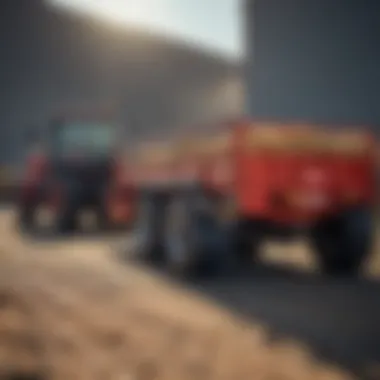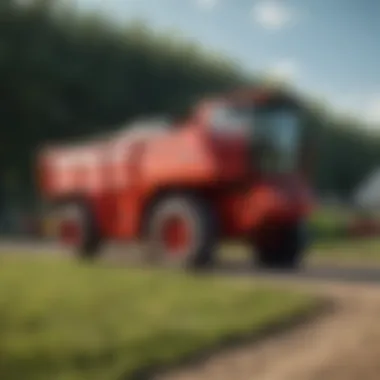The Top Yard Trailers for Agricultural Excellence


Overview of the Topic
Yard trailers play an essential role in modern agriculture. They serve various purposes, such as transporting goods, debris, or equipment around farms and gardens. Their capacity and versatility make them invaluable for farmers and hobbyists alike. Understanding the different types and features of yard trailers can significantly impact productivity in agricultural operations.
Definition and Importance
A yard trailer is a wheeled vehicle designed to be towed by machinery or vehicles. These trailers can range in size and design, from small utility models to larger models capable of carrying substantial loads. The importance of yard trailers lies in their ability to simplify manual labor, allowing for more efficient movement of materials. This not only saves time but also reduces physical strain on workers.
Current Trends
In recent years, there has been a shift towards the adoption of yard trailers equipped with advanced features. For instance, many manufacturers have integrated hydraulic systems for easier unloading. Some modern yard trailers now use lightweight materials, making them easier to tow without compromising capacity. Additionally, eco-friendly practices are influencing the design of trailers, with options for electric models emerging in the market.
Key Techniques and Practices
To effectively utilize a yard trailer, understanding certain techniques and practices is crucial.
Step-by-Step Guide
- Assess Your Needs: Determine the maximum load you need to carry and the type of terrain.
- Choose the Right Size: Select a trailer that fits your towing vehicle's capacity and your hauling needs.
- Inspect the Trailer: Before use, ensure that tires, brakes, and connections are in good condition.
- Load Properly: Distribute weight evenly in the trailer to maintain stability and control.
- Practice Safe Towing: Familiarize yourself with towing dynamics, especially in turns and in reverse.
Tools and Equipment Needed
- Towing Vehicle: Ensure it has sufficient power to handle the trailer's load.
- Hitch: A compatible hitch is necessary for connection.
- Safety Gear: Use gloves and other protective gear while loading.
Challenges and Solutions
While using yard trailers offers various benefits, challenges can arise.
Common Obstacles
- Overloading: Exceeding the trailer's weight limit can cause damage or accidents.
- Terrain Issues: Poor ground conditions can lead to stuck trailers or mishandling.
- Maintenance Neglect: Regular maintenance is often overlooked, leading to mechanical failures.
Innovative Solutions
- Weight Monitoring Systems: Some trailers come equipped with features to monitor load weight.
- All-Terrain Models: Investing in trailers designed for rough terrain can mitigate issues.
- Regular Check-Ups: Implement a routine maintenance schedule to avoid breakdowns.
"Proper maintenance and careful usage of yard trailers significantly extend their lifespan and improve overall performance."
Prologue to Yard Trailers
Yard trailers play a critical role in enhancing productivity in agricultural work. These versatile tools serve a variety of functions, from transporting heavy loads to providing support during various farming tasks. Understanding yard trailers is essential for agricultural farmers and enthusiasts. This section aims to present a solid foundation regarding their definition and importance in agriculture, providing insights that guide the selection of the right trailer for specific needs.
Definition and Purpose
A yard trailer is essentially a non-motorized vehicle designed for transporting various materials around a farm or yard. The primary purpose of these trailers is to assist in moving goods such as soil, fertilizer, tools, and even livestock. They connect to a towing vehicle, commonly a tractor or a utility vehicle. Different designs of yard trailers cater to distinct purposes, thus ensuring flexibility in agricultural applications. Many are built with robust materials to withstand varying loads and harsh environmental conditions.
Yard trailers exhibit features such as a flatbed for easy loading and unloading, and some models incorporate dumping capabilities to expedite processes. Overall, the choice of a yard trailer depends on the specific tasks it needs to perform in the agricultural landscape.
Importance in Agriculture
Yard trailers significantly contribute to the efficiency of farming operations. They enable workers to transport large quantities of materials with ease. This leads to time savings and reduces physical effort in moving items by hand. Furthermore, using trailers minimizes the risk of injury for workers, as they provide a safer means of transporting goods compared to lifting and hauling manually.
The versatility of yard trailers is also worth mentioning. They are used for various agricultural activities, from planting to harvesting. In addition, the right yard trailer can enhance productivity by streamlining workflow in tasks such as:
- Fertilizer Distribution: Quickly moving fertilization materials to different field sections.
- Equipment Transportation: Safely carrying tools between different areas of the farm.
- Bulk Material Handling: Facilitating transportation of soil or grains during different seasons.
"Choosing the right yard trailer means better productivity and reduced labor costs on the farm."
Moreover, the importance of proper maintenance of these trailers cannot be overstated. Regular checks help maintain their functionality, ensuring that they last longer and perform optimally. By understanding the pivotal role yard trailers play, farmers can make better decisions about their agricultural operations.
Types of Yard Trailers
Understanding the different types of yard trailers is essential for anyone engaged in agricultural activities. Each trailer type serves distinct purposes, which directly impacts productivity and efficiency. Knowing these types allows for better choices tailored to specific tasks such as hauling materials, equipment, or livestock.
Dump Trailers


Dump trailers are designed primarily for transporting and unloading bulk materials. Their ability to tilt for easy unloading provides considerable advantage when dealing with loose items like soil, gravel, or compost. The hydraulic mechanism used for dumping enhances efficiency, reducing manual labor. These trailers often come in various sizes to accommodate different load capacities, which is crucial for agricultural operations needing versatility. Additionally, the material used, such as steel or aluminum, can affect durability and weight capacity.
Utility Trailers
Utility trailers stand out for their adaptability. These trailers usually feature a flatbed design, enabling the transport of a wide range of goods. Farmers often use them for moving tools, equipment, and even small livestock. The open design allows for easy access, and some models come equipped with side rails or ramps for enhanced functionality. When selecting a utility trailer, consider the weight rating, as this is vital for ensuring that it can handle specific loads.
Flatbed Trailers
Flatbed trailers are popular in both agricultural and industrial settings. They provide a completely flat surface, which can be advantageous for transporting larger equipment like tractors and hay bales. Their open design allows for versatile loading options, making them a preferred choice for operations that involve awkwardly shaped or oversized items. Flatbed trailers can vary significantly in size and construction materials, which can impact both weight capacity and durability. Thus, selecting a flatbed trailer that matches your specific needs is critical.
Gooseneck Trailers
Gooseneck trailers are particularly effective for heavy-duty hauling. They attach to a vehicle via a hitch mounted in the bed, which improves stability and reduces swaying. This design allows for greater weight distribution, enabling the transport of heavy machinery or large quantities of products. Furthermore, many gooseneck trailers come with additional features such as additional storage compartments or ramps facilitating loading and unloading. Farmers who require reliable and sturdy trailer options for substantial hauls often favor this type due to its robustness.
Understanding these types of trailers helps farmers and agricultural enthusiasts make informed decisions to maximize their operational efficiency. Each trailer has unique advantages depending on the tasks at hand.
Key Features to Consider
Understanding the key features of yard trailers is crucial for farmers and enthusiasts alike, as these elements directly influence functionality and performance in various agricultural operations. Selecting the right trailer involves more than just knowing its type; it requires evaluating characteristics that affect its usefulness, durability, and overall effectiveness. Important features include load capacity, material durability, wheel size and type, and hitching mechanisms. Each aspect plays a vital role in ensuring the best performance for your specific needs.
Load Capacity
Load capacity refers to the maximum weight a yard trailer can safely carry. This measurement is critical, especially in agricultural settings where heavy loads of soil, equipment, or produce are common. Selecting a trailer with the appropriate load capacity ensures safety and efficiency during transport.
When assessing load capacity, consider the following factors:
- Vehicle Compatibility: Ensure your towing vehicle can handle the weight.
- Operational Needs: Evaluate the types of materials you plan to transport regularly.
- Regulatory Compliance: Some areas may have regulations on the maximum load a vehicle can carry.
In general, understanding load capacity helps prevent overloading, reduces the risk of accidents, and extends the lifespan of both the trailer and the vehicle.
Material Durability
The material used in trailer construction is essential for its longevity and effectiveness. Yard trailers are often exposed to harsh environments, including wet, muddy, or rugged terrains. Thus, durable materials help in maintaining performance and reducing wear and tear.
Common materials for yard trailers include steel, aluminum, and reinforced plastics. Each has its advantages:
- Steel: Known for strength, steel is ideal for heavy-duty applications but can be prone to rust if not properly treated.
- Aluminum: Lightweight and resistant to corrosion, aluminum trailers are easier to tow but may not support as much weight as steel.
- Reinforced Plastics: While not as common, these materials offer excellent resistance to the elements and are often easier to clean but can lack the structural integrity of metals.
Choosing a trailer with suitable material ensures you are investing in a product that will withstand the rigors of agricultural use.
Wheel Size and Type
Wheel size and type greatly influence a trailer's stability and performance. Choosing the right wheels can impact how well the trailer handles heavy loads, rough terrain, and various weather conditions.
When evaluating wheel options, consider:
- Diameter: Larger wheels often provide better traction and smoother rides on uneven ground.
- Type: Pneumatic tires offer cushioning and grip, while solid rubber tires reduce puncture risks but may impact ride comfort.
- Axle Configuration: Single or dual axles affect load distribution and stability. Dual axles generally offer increased carrying capacity and stability.
The appropriate wheel specifications are fundamental for ensuring your trailer operates efficiently and safely across fields and farms.
Hitching Mechanism
The hitching mechanism connects the yard trailer to the towing vehicle. A secure hitch is essential for safe transport, as it helps prevent accidents and ensures stability during travel.
There are various types of hitching systems, including:
- Bumper Pull: A common option for many trailers, this hitch attaches at the vehicle's bumper and is suitable for lighter loads.
- Gooseneck: This hitch design is recommended for heavier loads as it allows for better weight distribution, enhancing stability.
- Fifth Wheel: Often used in larger trailers, this system connects to a special plate mounted in the truck bed, providing superior towing stability.
Selecting the right hitching mechanism can greatly enhance the safety and ease of use of your yard trailer. It is critical to ensure compatibility with your towing vehicle and to verify that it can manage the weight of your trailer and its load.
Choosing a yard trailer without a thorough understanding of these features can lead to poor performance and safety issues. Take the time to consider each element to find the right model for your needs.
Top Yard Trailers on the Market
Understanding the top yard trailers available can greatly influence your purchase decision. Each model brings its unique benefits and caters to various needs. For farmers and enthusiasts alike, choosing the right trailer becomes more than a mere acquisition; it is a strategic decision that enhances productivity and operational efficiency.
When looking at these trailers, you need to consider not just the upfront cost but also the long-term value they bring. This includes aspects such as durability, ease of use, and ability to handle diverse tasks. By focusing on the best products in the market, you can make informed choices that will pay off in the long run.


Product A
The first product to consider is the BigTex 70SR Dump Trailer. Known for its remarkable towing capacity and robust build, this trailer offers an impressive load rating. It features a scissor lift design, making the unloading process swift and efficient. The frame is made from high-quality steel, ensuring longevity even under harsh conditions.
Key features include:
- Load Capacity: Can handle up to 7,000 pounds, making it suitable for various tasks.
- Material: Constructed with heavy-duty steel, it withstands rust and corrosion very well.
- Hitching: The 2-inch ball coupler is standard, ensuring compatibility with most vehicles.
This trailer is an excellent option for farmers needing to transport materials quickly and efficiently. It stands out for its reliability and user-friendly design.
Product B
Next, we have the Carry-On 6x10 Utility Trailer. This model is perfect for those who need versatility in their operations. It is lighter than others but highly functional. The trailer comes with a treated wood floor and sturdy side rails, giving added security when transporting tools or equipment.
Important attributes include:
- Weight: At around 1,000 pounds, it is easier to maneuver.
- Durability: The powder-coated finish helps resist harsh weather
- Versatility: The option to add accessories like side rails significantly increases its usability.
Its affordability and functional design make it a favorite among those starting their agricultural journey.
Product
Finally, consider the PJ Trailers 14K Gooseneck Flatbed Trailer. This model is a favorite for those who require heavy-duty hauling. With a load capacity of 14,000 pounds, it is designed for serious work. The trailer has a rugged design, perfect for transporting larger equipment or bulk materials.
Notable specifications are:
- Construction: Built with a 12-inch I-beam main frame, it offers enhanced strength.
- Axles: Featuring dual axles, it provides better distribution of weight.
- Brake System: Equipped with hydraulic brakes for improved control.
This flatbed trailer is suitable for those engaged in extensive farming operations and need reliability in significant hauling tasks.
Performance Metrics
Performance metrics are vital criteria to assess the effectiveness and efficiency of yard trailers. When selecting a trailer for agricultural purposes, understanding these metrics ensures that farmers and enthusiasts can make informed decisions. Performance metrics help in evaluating the trailer's capabilities under various operational conditions, which informs purchases that optimize productivity.
Towing Capacity
Towing capacity refers to the maximum weight a trailer can safely haul without compromising safety or performance. This metric is essential for farmers because it directly affects the ability to transport heavy loads, such as tools, crops, or equipment.
Higher towing capacity often correlates with sturdier construction and enhanced braking systems, which are crucial for maintaining control on uneven terrain. A well-chosen trailer based on towing capacity prevents potential accidents and damage to both the trailer and the towing vehicle.
It is also critical to match the towing capacity of the trailer with that of the vehicle used for transport. For instance, if a powerful truck pulls a trailer, but the trailer’s capacity is below the load intended, it can lead to inefficiencies or even mechanical failures.
Stability during Transport
Stability during transport is another significant performance metric to consider. This includes aspects such as load distribution, wheelbase, and overall trailer design. A stable trailer reduces the risk of swaying or tipping, especially on uneven agricultural land.
Stability greatly impacts the safety of transporting materials. A trailer that is stable allows the driver to maintain better control, resulting in smoother rides and lesser wear on the vehicle. Proper stability can also lead to less potential for product loss during transport, which is an economic consideration for farmers.
It is important to inspect the trailer's stabilizing features, such as anti-sway technologies and proper weight distribution mechanisms, before purchase.
Maintenance Requirements
Maintenance requirements determine the longevity and reliability of yard trailers. Regular maintenance ensures that all components, from the tires to the hitching mechanism, are in optimal condition. This prevents unexpected breakdowns during critical agricultural tasks, which can lead to wasted time and resources.
Farmers should be aware of the specific maintenance needs tied to the type of trailer, including checks on:
- Brakes: Ensuring they function effectively to prevent accidents.
- Tires: Monitoring for proper inflation and tread wear to maintain traction.
- Hitch: Verifying secure connections to prevent disconnects during transport.
Adhering to maintenance schedules is crucial. It not only keeps the trailer functioning but also significantly lowers long-term repair costs.
"A well-maintained yard trailer is an asset to agricultural work, leading to improved productivity and safety."
Understanding these performance metrics empowers farmers and enthusiasts to enhance their work operations through informed selections of yard trailers.
Maintenance of Yard Trailers


Maintaining yard trailers is crucial for their longevity, efficiency, and safety. Neglecting maintenance can lead to costly repairs and decreased performance. Regular maintenance practices are essential to ensure that these trailers operate effectively under varied agricultural conditions. When yard trailers are properly maintained, they can enhance productivity by minimizing downtime during operation.
Routine Inspections
Routine inspections of yard trailers should be a regular part of your maintenance schedule. These checks are important for identifying potential issues before they escalate into major problems. Key aspects to inspect include:
- Tires: Check for wear and proper inflation to avoid flat tires during transport.
- Brake System: Ensure brakes are functioning correctly to prevent accidents.
- Hitch Mechanism: Confirm that the hitch is secure and free of corrosion.
- Frame and Suspension: Look for signs of wear or damage that can impede performance.
Incorporating routine inspections into your maintenance routine will provide a better understanding of your trailer’s condition. Remember, it’s often easier and less expensive to address minor issues than to wait for them to become severe.
Cleaning and Care
Keeping your yard trailer clean is essential not only for aesthetic purposes but also for function. Debris, mud, and other build-ups can lead to corrosion and mechanical failures. Regular cleaning prevents dirt accumulation that can compromise moving parts. Some effective cleaning tips include:
- Wash the trailer after use, especially if it has come into contact with corrosive materials or chemicals.
- Use mild detergents to avoid damaging the surface material.
- Dry every part thoroughly to prevent rust.
Additionally, applying protective coatings can enhance durability. Seasonal cleaning will prolong the life of your trailer, resulting in reduced maintenance costs over time.
Repair Practices
Understanding repair practices is key to maintaining the functionality of your yard trailer. Being proactive about repairs can enhance your safety and the trailer's performance. When repairs are needed, consider the following:
- Prompt Repair: Don't ignore small issues. Attend to them as they arise to avoid larger problems down the road.
- Use Quality Parts: To maintain integrity, always replace parts with high-quality or OEM replacements.
- Document All Repairs: Keep a logbook of repairs and maintenance, which can provide insight into patterns and potential issues over time.
Regular maintenance not only ensures safety but also sustains the value of your investment.
In summary, proper maintenance of yard trailers is indispensable for any agricultural operation. Regular routine inspections, thorough cleaning, and prompt repair practices lead to improved performance and safety. Farmers and agricultural enthusiasts should prioritize these elements to maximize the utility of their yard trailers.
Innovations in Yard Trailer Design
Exploring innovations in yard trailer design is crucial for modern agriculture. This section highlights the advancements that address the evolving needs of farmers and land managers. Innovations can enhance efficiency, reduce labor costs, and increase productivity. Understanding these developments helps in selecting the right trailer that meets the demands of contemporary agricultural practices.
Smart Technology Integration
The integration of smart technology into yard trailers represents a significant advancement. This inclusion allows for better tracking of load weights and real-time monitoring of equipment performance. Farmers can benefit from GPS systems that assist in navigation and provide route optimization. This technology not only improves efficiency but also ensures safer operations. For instance, smart sensors can alert users to potential maintenance issues before they escalate, preventing costly repairs.
Key features of smart technology in yard trailers include:
- Load Sensors: Measure the weight and balance of the trailer, ensuring optimal towing capacity.
- Telematics: Provides data on usage patterns and maintenance schedules.
- Mobile App Connectivity: Allows users to monitor performance remotely, leading to better decision-making.
"Integrating smart technology into yard trailers allows for increased productivity and better resource management."
Eco-Friendly Materials
The shift towards eco-friendly materials in yard trailer design is noteworthy. As environmental concerns grow, manufacturers are exploring sustainable options. Using recycled materials in trailer construction can significantly reduce the carbon footprint. Not only does this contribute to environmental sustainability, but it also can result in lighter trailers, improving fuel efficiency.
Benefits of eco-friendly materials include:
- Reduced Environmental Impact: Lower emissions and resource conservation.
- Durability: Many sustainable materials offer durability comparable to traditional options.
- Market Demand: An increased number of consumers prefer eco-conscious products, which can enhance brand reputation.
Customizable Features
Customizable features are becoming essential in yard trailer design. Farmers often have unique requirements based on their specific operations. The ability to tailor features such as size, loading mechanisms, and attachments can greatly enhance the utility of a yard trailer.
Some customizable options include:
- Adjustable Deck Heights: Allows for transporting various types of loads.
- Interchangeable Attachments: Enables the trailer to serve multiple functions, such as dumping or flatbed use.
- Paint and Finish Choices: Personalization can provide aesthetic appeal or functionality, like better rust resistance.
Incorporating these innovations in yard trailer design will attract a new generation of farmers who prioritize efficiency, sustainability, and customization. The ongoing advancements reflect a responsive approach to the challenges faced in agricultural environments.
Finale
The conclusion of this article plays a crucial role in summarizing the essential insights gained about yard trailers. It is imperative for readers to connect all discussed aspects effectively. Ultimately, the selection of the right yard trailer can significantly influence productivity in agricultural operations. Understanding different models and their specific functions allows farmers to make informed decisions tailored to their specific needs.
Final Thoughts on Selection
Selecting the right yard trailer encompasses several factors that extend beyond aesthetics or brand reputation. Consideration should be given to load capacity, the materials used in construction, and the hitching mechanism. A well-chosen trailer can increase efficiency and decrease operational costs in the long run. Additionally, evaluating performance metrics such as towing capacity and stability is essential. Relying on personal experiences and recommendations from experts can also enhance the decision-making process.
"A properly selected yard trailer is not just an addition to equipment but a crucial component that can streamline farm operations."
Future Trends in Yard Trailers
Looking towards the future, various trends are shaping the design and functionality of yard trailers. Advancements in smart technology are being integrated to offer users enhanced capabilities, such as GPS tracking and automated loading systems. Moreover, there is a noticeable shift towards eco-friendly materials in trailer construction. These changes respond to environmental concerns while aiming for sustainable practices. Lastly, customization options are set to grow, allowing farmers to adapt trailers to unique operational needs. The combination of these trends signals a promising future for yard trailer innovation.



